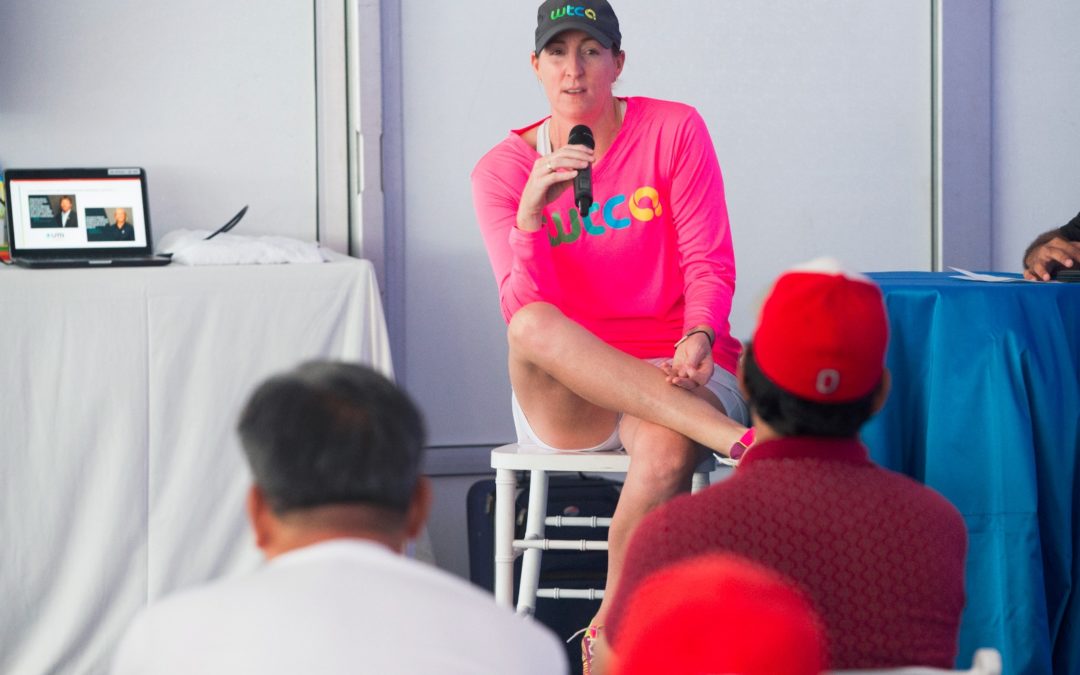Before the WTCA grew into a network of over 58,000 people from across the globe, it was a simple idea created during a casual conversation between two friends.
When CEO Sarah Stone was on holiday in Australia, she and a close friend chatted about a noticeable gap in social media coverage of female players. In order to mitigate this issue, Stone created a Facebook page called ‘Women’s Tennis Coaching,’ which highlighted drills and female-specific coaching methods.
Perhaps somewhat unexpectedly, the page caught fire within the tennis community, eventually leading Stone to transform her idea into the nonprofit organization that we now know as the Women’s Tennis Coaching Association.
Prior to this historic conversation, Stone was
“To get more female coaches, I thought the best idea was to get more male coaches to advocate for women’s tennis. I wanted to get them educated on how to work with female players, and then that would create a better environment where female coaches could also thrive. That’s why I started the WTCA,” said Stone.
Initially, the WTCA served as a platform to highlight females in tennis on social media because the ratio of male to female media coverage is dismal across the entire sporting world. At the time, the WTA was the only other platform sharing anything about women’s tennis. Stone believed that with the WTCA, the landscape of the game could be changed in order to keep more girls in tennis.
From there, the organization continued to evolve. Stone asked Ann Grossman Wunderlich to come aboard as the WTCA’s President due to her warm personality, knowledge of the game and expansive network.
It was Grossman-Wunderlich who first suggested the WTCA put on a conference, which led the duo to rally their network to put on the first annual WTCA Conference NYC. The event was a massive success, leading to a number of additional conferences across the globe in Indian Wells, Paris and the United Kingdom.
In order to generate these successful events, the WTCA has focused on leveraging a network of high-profile names within the sport who also strongly believe in the mission of the WTCA. “We have great contacts and great friends who have been very successful in tennis and support our mission of keeping more girls in tennis because they are passionate about the same things. A lot of them want to see tennis change for women as well, so they want to be involved,” Stone explained.
The influence that the WTCA has had on women’s tennis has been prolific to say the least. “The major tennis federations now have specific education for their coaches on how they can work well with females. That never existed before the WTCA,” said Stone. “Things have changed. Tennis Europe’s theme for their conference last year was women’s tennis, and that has never been done before. It’s a strong indication of our impact.”
With the women’s movement in full swing, organizations are constantly in search of ways to empower their female participants. Therefore, the WTCA has been able to form a number of beneficial partnerships with respected educational bodies within the sport.
“We have a community of over 58,000 people on our platforms, so many organizations are recognizing that we’ve been able to obtain a large following,” said Stone. “We have a very strong community that feels passionate about our brand. Our partners such as the PTR and the ITA see that our brand is something special to align with.”
The WTCA community is another source of pride for Stone. “When people tell me that the first thing they check every morning is the WTCA to find out what they can learn, it feels pretty cool. I really want to help people and that’s a great way to have a massive reach,” she said.
“It’s really nice when people I truly respect and admire, and who are great role models, say that we’re doing a fantastic job as a team,” Stone reflected. “By doing our second conference, people realized we were here to stay. After the New York Conference, we had people sharing content over a month later, so that was really cool to see.”
Moving forward, the WTCA is hoping to expand its reach even further into additional international markets. “We’re to expand our conferences to Barcelona next year. We want to tap into the Spanish community of tennis. We would also like to do an event in China this year,” said Stone. “Additionally, we’re also working with strong partners like TennisPAL and Technifibre. A measurement of success for me is that our partners want to stay on board year after year. Fostering those relationships is a great measurement of success, the fact that they really believe in the brand.”
Above all, the WTCA is striving to make a true impact for women in the sport of tennis. “It’s not about making money. We work really hard to make sure everyone feels like they have a part in what we’re doing and it’s an all-inclusive organization,” said Stone.
Surely, the WTCA will be a force to be reckoned with within the tennis community for many years to come.

